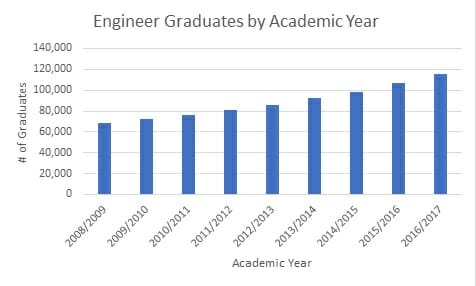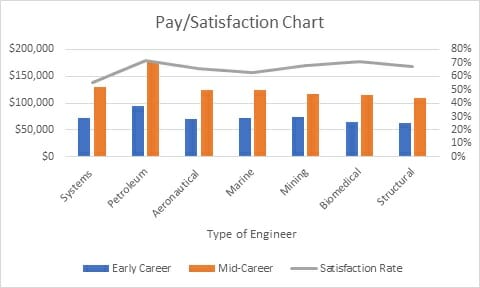The field of engineering is one of the older STEM fields that has shown a constant increase in the number of graduates each year since the 2008/2009 academic year. If the employment potential was not there, this chart would not have a continuing upward trend.

Data Source: https://nces.ed.gov/programs/digest/d18/tables/dt18_322.10.asp
However, there is more to a career than just having a job. Most of us want one that is rewarding, and one where we feel our work is making a difference in the world. Below are seven chosen engineering careers that not only pay well, have a constant growth rate between 3% and 9%, and high level of satisfaction according to engineers working in these fields.
Systems engineering
Systems engineers build and manage complex systems for a variety of businesses. The types of systems include people, equipment and software. A system engineer needs high skills in math and information security, along with above average skills in management and interpersonal communication.
- Satisfaction Percentage: 55%
- Early Career Pay: $72,300
- Mid-Career Pay: $130,400
Petroleum engineering
The oil in your car’s engine (unless you are driving an all-electric) and natural gas that you use to heat your house comes as a result of work done by petroleum engineers. They must analyze, design, and implement plans for extraction of the crude oil and gas once a natural underground reservoir is found. While the push toward renewable and clean energy will affect job growth in this field in the future, there is still a good potential for graduates for years to come. Students entering this field need good skills in math, science, mechanical engineering and physics.
- Satisfaction Percentage: 72%
- Early Career Pay: $94,500
- Mid-Career Pay: $176,900
Aeronautical engineering
Engineers in this field use aerodynamics to test aircraft designs to see which ones are the most efficient. Advances in fuel technology, new composite materials and noise pollution reduction will support employment numbers well into the future. Additional training in software like C++, along with a focus on structural engineering will increase the value of this graduate.
- Satisfaction Percentage: 66%
- Early Career Pay: $70,600
- Mid-Career Pay: $124,800
Marine engineering
Marine engineers are a type of system engineer in that they design and test components found inside ships such as steering, power, refrigeration and lighting. Graduates must know calculus, chemistry, physics, mechanical engineering, and algebra in order to do this type of work.
- Satisfaction Percentage: 63%
- Early Career Pay: $72,600
- Mid-Career Pay: $123,600
Mining engineering
In the past and up to now, mining engineers worked on ways to safely and economically extract coal and metals from deep inside the Earth. But with a reduction in mining of coal, the future of mining may be extracting precious metals from asteroids and other bodies in outer space. The Colorado School of Mines is the first school to offer a space resource course to prepare graduates for the future in this new area of mining.
- Satisfaction Percentage: 68%
- Early Career Pay: $74,900
- Mid-Career Pay: $116,600
Biomedical engineering
A biomedical engineering graduate takes many of the same courses that medical students take to work this field. Students can take one of several disciplines in this field, including medical imaging, nanotechnologies, genetic engineering, or prosthetics. As our aging population continues to grow, the demand for this type of engineer will continue to grow, too.
- Satisfaction Percentage: 71%
- Early Career Pay: $64,700
- Mid-Career Pay: $114,600
Structural engineering
A specialty within the civil engineering field, this type of engineer concentrates mainly on the design and structure of buildings, bridges, and roadways. While in school, students take a variety of courses including physics, math, and material properties. Once employed, they work alongside architects and construction officials to design structures that will best withstand the pressures of snow, wind, and earthquakes.
- Satisfaction Percentage: 67%
- Early Career Pay: $63,600
- Mid-Career Pay: $108,800
As the chart below shows, of the engineers highlighted in this report, a petroleum engineer not only makes the most money both early and through their mid-career, but they also have the highest satisfaction rate. A win/win for this type of engineer!





